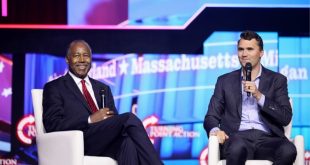 At the recent annual convention of Al Sharpton’s National Action Network, President Obama said his political opponents are “pass[ing] laws to make it harder, not easier, to vote.”
At the recent annual convention of Al Sharpton’s National Action Network, President Obama said his political opponents are “pass[ing] laws to make it harder, not easier, to vote.”
It was another attempt by the President and his supporters to energize their base — in this case, African-Americans — through scare stories they hope will move masses to the polls in November.
Claims over whether voter ID and other polling place protections are intentional attempts to suppress minority voters generally supportive of liberal politicians continues to garner headlines. Historic attempts to suppress votes cannot be denied, but there have been numerous attempts to deny voters’ voices when convenient or expedient — and not all are Jim Crow analogies.
For example, there was an upstart community organizer from Chicago who ran for a state senate seat in Illinois in 1996. He won his party’s nomination, in part, by invalidating thousands of names on his opponents’ petitions – including those supporting the incumbent – by looking for inconsistencies in names, addresses and pertinent registration information.
Currently embattled ballot protection efforts such as list purges are used to deal with many of these same inconsistencies this candidate used to knock out his competition and eventually run unopposed in the primary and win easily that November.
During the 2008 presidential primaries, party officials in Florida and Michigan improperly held their primaries earlier than national party leaders allowed. The Republican Party held to its rule that such violations meant only half a state’s delegation would be seated at the convention, but Democrats held their delegations in political limbo. Full voting rights were restored just before the convention — after the presumptive nominee was secure in his victory. Until then, the nominee — once again, the community organizer from Illinois — remained remarkably silent as his party threatened to essentially invalidate primary votes in two states.
Ironically, the organizer responsible for both those political maneuvers was the same person complaining about voter suppression at Sharpton’s convention — President Barack Obama.
To think that only one political party might suppress minority votes with malicious intent is erroneous. Politics is a tough game. To assume only one party or group would resort to such tactics is naïve and preposterous. Such naiveté leads to ironies such as our President, who actively limited voter options in 1996 and was silent when votes were at risk of being invalidated in 2008, now seeking to invigorate a lackluster base by stoking fears of voter suppression.
Sadly, when political power is the goal instead of addressing the problems ailing minority communities, actions such as Obama’s seem more commonplace.
The oft-repeated statistic that 25 percent of African-Americans lack valid identification should not be a reality in which we live but a problem upon which we place intense focus.
Imagine the disparate economic suppression occurring when a quarter of any community cannot open a banking account, attend institutions of higher education, travel by air or rail to find jobs or enter government buildings.
By simplistically stating that one side wants to suppress votes while ignoring the other’s own history of suppression, and not recognizing the opportunity to solve two problems with one simple program, it indicates there is more focus on gaining power than helping the communities in need.
Consider how many voter ID laws give ample time to obtain free state-issued ID — particularly North Carolina’s new law granting three years from passage to full implementation. Additionally, interest group infrastructure used to “get out the vote” could be marshaled to get people IDs and the lasting benefit that comes with them.
But while this helps alleviate two problems — voter fraud and lack of economic opportunity — it takes away a powerful accusation enjoyed by the President and his supporters. That’s probably why, when civil rights icon Andrew Young and former president Bill Clinton both advocated for putting photos on Social Security cards as a means of increasing voter ID compliance, the White House could not comment.
If only politicians were focused on solving problems instead of exaggerating other perceived problems to gain political points, America would be better off.
 Hughey Newsome, a business consultant in the D.C. area, is a member of the national advisory council of the black leadership network Project 21. Comments may be sent to Project21@nationalcenter.org.
Hughey Newsome, a business consultant in the D.C. area, is a member of the national advisory council of the black leadership network Project 21. Comments may be sent to Project21@nationalcenter.org.
Photo credit: kayranft (Creative Commons)
 CURE News and Clergy Blog News and Commentary for Christians
CURE News and Clergy Blog News and Commentary for Christians



